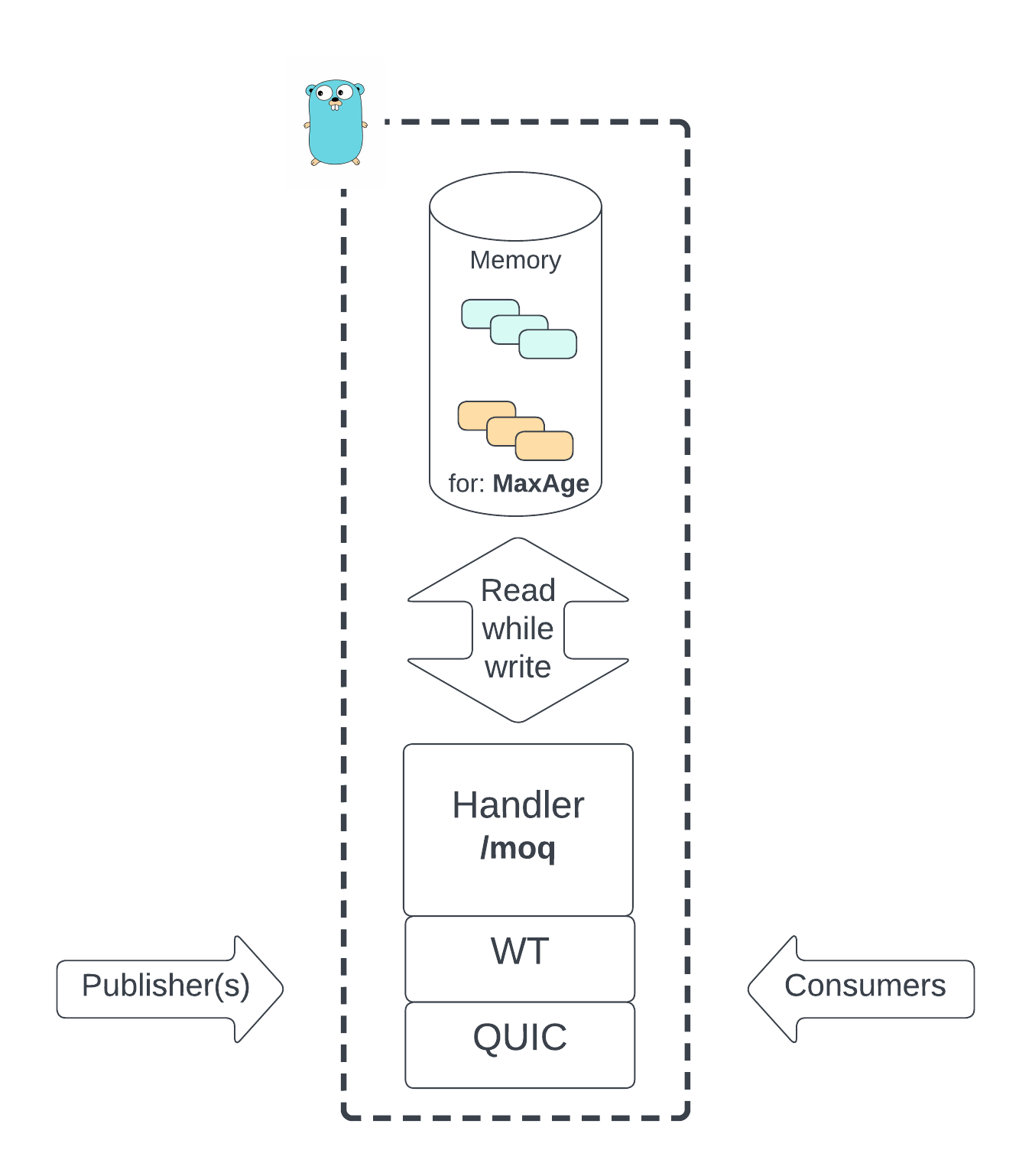This code is NO longer manteined, it is superseeded by moxygen
This is an experimental media MOQ relay (AKA: CDN node) based on MOQT draft-01. It can be used in conjunction with following live encoder and player moq-encoder-player. Both repos allows us create a live streaming platform where we can control latency and quality (and others), so we can test scenarios from ultra low latency live (video call) to high quality (and high scale) live.
In the following figure you can see an overview of the relay architecture
 Fig1: Relay architecture overview
Fig1: Relay architecture overview
To install this server in a CentOS linux instance follow the next steps:
-
Create a new user, and add it to sudoers
-
Configure firewall to allow:
- Inbound
- SSH: 22 TCP (From: [up to you])
- WT: 4433 UDP (From: everywhere IPv4 and IPv6)
- HTTPs: 443 (From: everywhere IPv4 and IPv6)
- HTTPs: 80 [Optional, just testing] (From: everywhere IPv4 and IPv6)
- Outbound
- ALL
- Inbound
-
Update server
sudo yum update -y- Install dependencies
sudo yum install git tmux -y- Install go version go1.20+
sudo yum install golang -y- Install and activate a webServer
sudo yum install -y httpd
sudo systemctl start httpd
sudo systemctl enable httpd
sudo yum install mod_ssl -y-
Configure certificates (needed for WebTransport)
- You can use any process you want to install valid signed certificates. We used LetEncrypt
-
Configure Apache
- Edit the main Apache configuration file
/etc/httpd/conf/httpd.conf. Locate the "Listen 80" and add the following lines after it, replacing the example domain names.
- Edit the main Apache configuration file
<VirtualHost *:80>
DocumentRoot "/var/www/html"
ServerName "yourdomain.com"
ServerAlias "subdomain.yourdomain.com"
</VirtualHost>
<VirtualHost *:443>
DocumentRoot "/var/www/html"
ServerName "yourdomain.com"
ServerAlias "subdomain.yourdomain.com"
SSLEngine on
SSLCertificateFile "/etc/letsencrypt/live/subdomain.yourdomain.com/fullchain.pem"
SSLCertificateKeyFile "/etc/letsencrypt/live/subdomain.yourdomain.com/privkey.pem"
</VirtualHost>-
Configure certificates
- In this stage stage you will need to show that you own the domain you are trying to configure (You will need to answer some questions)
-
Clone this repo
git clone git@github.com:facebookexperimental/moq-go-server.git- Compile it
cd moq-go-server/src
go build- Copy previously generated certs to allow this server to use them (careful with renewals)
cd ..
mkdir certs
sudo cp /etc/letsencrypt/live/subdomain.yourdomain.com/privkey.pem certs/certificate.key
sudo chmod 644 certs/certificate.key
sudo cp /etc/letsencrypt/live/subdomain.yourdomain.com/cert.pem certs/certificate.pem- Start server inside tmux
tmux
cd src
./moq-go-serverSee details on how use / set up this system as a live streaming relay in moq-encoder-player testing
This implementation allows relay to relay communication.
The way this works is the follwing:
- When relay starts reads the json file pointed by
--moq_origins_config, example./origins/example-origins.json(or see below) - It opens (and keep opened) an MOQT connection to all other relays it finds in that file
- The ANNOUNCE messages are kept in the relay where encoder is connected
- The SUBSCRIBE messages that does NOT find any local producer that matches its
tracknamespaceare forwarded to all the relays that offers that tracknamespace (viatracknamespacein its config)
{
"origins": [
{
"friendlyname": "test",
"guid": "3ea8e44a82784c7ba0c107b78d9dea9a",
"tracknamespace": "simplechat-relay",
"authinfo": "my super secret",
"originaddress" : "https://localhost:4455/moq",
"origincertpath": "./my-cert.pem"
}
]
}
It is recommended that you test on a server with valid certificate. To facilitate debugging you can:
- Install delve
sudo go install github.com/go-delve/delve/cmd/dlv@latest
- Build app for debug
cd src
go build -gcflags="all=-N -l"
- Run in debug mode in the remove machine
cd src
[GO PATH]/go/bin/dlv --listen=:2345 --headless=true --log=true --accept-multiclient --api-version=2 exec moq-go-server -- --listen_addr ":4455"
Note: The delve listen port needs to be open in that remote machine
- Connect VSCode (or other IDE) to that remote machine In this link you can find a good guide
Note: Webtransport implementation of QUIC-GO currently does NOT allow localtesting, see open issue
moq-go-server is released under the MIT License.

